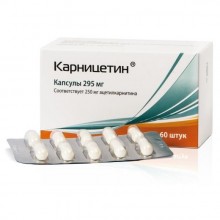



Acetyl-L-carnitine (ALA), a natural biologically active substance, is present under physiological conditions in the body in various organs and tissues, including the central nervous system, and is involved in the metabolism of fatty acids and carbohydrates. The pharmacological and biological effects of ALA are largely due to the metabolic effects of L-carnitine and the acetyl group that make up it. Acetyl-L-carnitine (ALA), a biologically active form of L-carnitine, a key substance in the process of catabolism of fats and the formation of energy in the body. ALA is synthesized in the brain tissue, liver and kidney from L-carnitine with the participation of the enzyme carnitine acetyltransferase. Since ALA supplies activated acetate directly to the matrix of mitochondria for the formation of acetyl CoA, which participates in the tricarboxylic acid cycle, without additional energy expenditure, it is an easily accessible substrate for starting energy-dependent mitochondrial metabolic processes. Due to the full-fledged energy supply of the body with less oxygen consumption by tissues, ALA protects brain tissue from ischemia.
Due to its structural similarity with acetylcholine, ALA has a cholinomimetic effect, and also exhibits neuroprotective properties. It increases the cellular concentration of aspartic and glutamic acid, as well as taurine, with prolonged use increases the density of N-methyl-D-aspartate - receptors in the hippocampus, cortex and striatum and prevents their density from decreasing in aging conditions. ALA enhances the effects of serotonin and also protects brain cells from the neurotoxic effects of ammonia and glutamate.
The results of experimental studies have shown that ALK has anti-anamnestic activity, the ability to improve learning processes, indicators of non-associative memory, to have a positive effect on mnestic functions in an experimental Alzheimer's disease model, without causing side effects of a sedative and muscle relaxant.
ALA increases energy production, being an easily accessible substrate for triggering energy-dependent metabolic processes in the mitochondria. Stimulates the synthesis of proteins and phospholipids for the construction of membranes, improves regeneration processes. In pathology, it has a neuroprotective effect, especially in relation to neurons and their organelles (mitochondria), as well as a neurotrophic effect by modulating the activity of nerve growth factor (NGF). It has antioxidant and membrane stabilizing effect. ALA can accelerate the regeneration of nerve cells in traumatic and endocrine injuries of peripheral nerves in experimental models of polyneuropathy in diabetes.
ALA has a noticeable effect on slowing the aging process by increasing the transport of fatty acids to mitochondria and maintaining their work at the level of a young organism. ALA can accelerate the regeneration of nerve cells in traumatic and endocrine injuries of peripheral nerves in experimental models of diabetes.
Acetylcarnitine hydrochloride (Carnicetine) 0.295 g
Excipients: microcrystalline cellulose (MCC); colloidal silicon dioxide (Aerosil A-300); magnesium stearate - to obtain the mass of the capsule content of 0.34 g.
Hard gelatin capsules: the composition of the capsules is gelatin; glycerol (glycerol); nipagin (methyl parahydroxybenzoate); nipazol (propyl parahydroxybenzoate); sodium lauryl sulfate; purified water, titanium dioxide.
No customer reviews for the moment.
For oral use. The single dose for adults is usually 1–4 caps., The daily dose is 6–12 caps. The course of treatment is 1–4 months.
Allergic reactions are possible; nausea, heartburn.
Cases of drug interactions are not marked.
Special studies on the possibility of using during pregnancy and during breastfeeding have not been conducted; apply only if the intended benefit to the mother exceeds the risk to the fetus. At the time of treatment should stop breastfeeding.
Cases of overdose are not registered.
Studies and clinical trials of Acetylcarnitine (Click to expand)